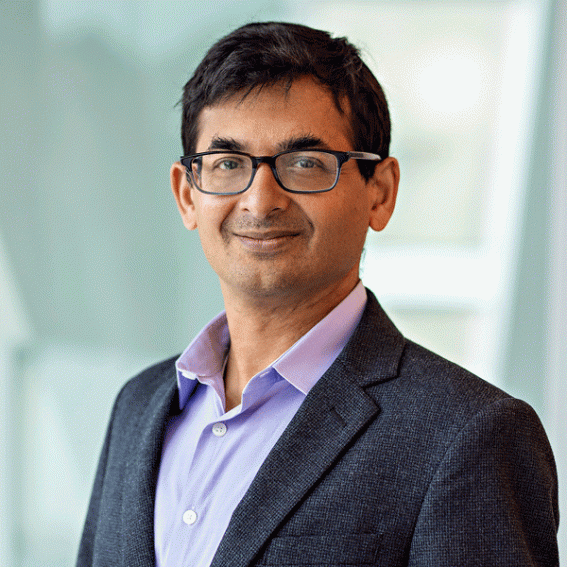Finance Professor Becomes New Associate Dean of Graduate Programs
December 8, 2023

Nikunj Kapadia came to Amherst from New York City in 1996, joining the Isenberg faculty as a professor, then serving as Finance Department chair for several years before being asked to step into the role of associate dean of graduate programs this year.
“I joined Isenberg after completing my PhD at the New York University’s Stern School of Business,” says Kapadia. “I came here because it was close enough to New York that I could return whenever I wanted. My department chair Nelson Lacey, now retired, warned me that anyone who comes to Amherst doesn’t leave. I said ‘well, I don’t know—we’ll see about that.’ I looked at myself as a New Yorker. I loved the noise and commotion and being able to grab a meal at midnight. But what I found here in Amherst was a family. And I’ve found that’s a process that renews each time a new student or faculty member comes to Isenberg.”
Over the course of the last 26 years, Kapadia has seen Isenberg evolve into one of the most respected and influential business schools in the country, thanks to the remarkable dedication of its students, faculty, and administration. He plans to foster continued growth as he takes on leadership of the school’s master’s programs, which range from online and on-campus MBA degrees to specialized programs focused on accounting, business analytics, and finance.
“When I first joined the Finance Department, we didn’t have many of the top financial firms recruiting from UMass,” he says. “Now we do. We’ve got alumni in almost every major organization and an incredible track record of success. Isenberg has been a business school for a long time, and we’ve built this reputation step by step. In a sense, I’m stepping into a history-in-progress in which much of the hard work has already been done. My role is to help continue moving it forward.”
Preparing students for success
Connecting with students and providing mentorship on an individual level have always been essential aspects of Kapadia’s work, and he intends to keep it that way—even as the scope of that work expands.
“It’s about the students. What’s always excited me about academia is the ability to connect with and have a direct impact on individual students,” says Kapadia. “As educators, we are trying to prepare them to succeed in the world. As an instructor, I would engage one-on-one with 20 students at a time. In my new role, it’s now a matter of scaling up to engage and impact a thousand plus. It’s exciting—I get to implement some of the things I’ve seen work well over the years.”
Kapadia is also interested in the unique challenges faced by those UMass students who come to the school without any prior connection to or experience with the world of business, particularly those who are immigrants or the first in their families to attend university.
“Students who come to us sometimes don’t even know what’s possible out there,” he says. “I remember in my first year at UMass, there was a brilliant, absolutely astounding, student. I said, ‘You know what? You should really be at a top financial firm.’ We got him an interview at Goldman Sachs, and he expectedly got the offer. I assumed he would immediately accept the offer. But he comes to me and says, ‘Nope, I didn’t take the offer.’ I was floored. I realized that he had no idea of what it meant to work alongside some of the smartest folks in the field in NYC. I had to work hard to convince him to take the job.”
“A lot of students that come to UMass do not have an early exposure to the business world. That’s why a major responsibility we have to these students is to open their horizons,” Kapadia said. “In fact, I think that’s the best part of the job. What I’ve found is that students who come to this understanding of the business world in college or graduate school are much more focused as employees and less likely to take anything for granted. When our students enter the workforce, they perform phenomenally well. That’s been a big driver of the consistent growth we’ve seen at UMass.”
The changing face of engagement
As the COVID-19 pandemic unfolded, Kapadia watched as lockdown and the transition to online school and work models changed the ways in which students and colleagues interact. Many of those changes are still with us, and present challenges for students and recent grads entering the workforce. Kapadia sees this as an opportunity for the university to provide additional support and engagement to its student and alumni communities.
“Work-at-home has become common,” he notes. “Occupancy rate of offices in Boston and New York can be as low as 50%. That’s creating challenges for students who would once have taken advantage of mentoring opportunities or formed a peer group. One of the things I want to do is to create our own networking and mentoring systems within the school that can supplement what students are able to gain from the workplace.”
Ultimately, Kapadia points to a spirit of dedicated determination as UMass’ greatest strength.
“As a state university, we do not have the resources of some of the private schools in the region with very large endowments,” he says. “However, we more than make up for that by working harder to provide a world-class education with the services, the support, and the can-do spirit to get things done. When you look at Isenberg’s growth, it’s been amazing, and I look forward to building on that success.”